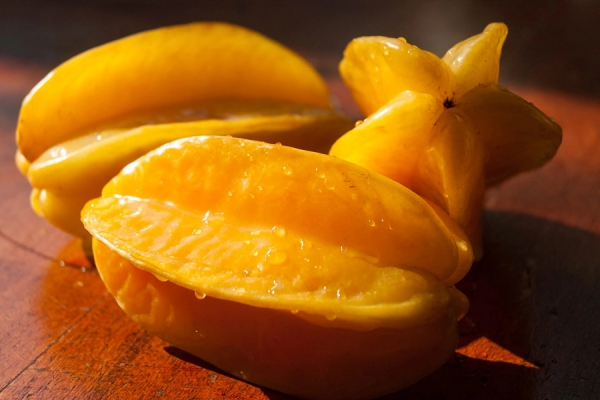Carambola – star fruit
Carambola is an evergreen tropical tree distributed in the Philippines, Malaysia, Sri Lanka, India, Indonesia and Bangladesh. In section, its fruit has the shape of a star, which is why it is also called "tropical star" or "star fruit".
When ripe, the fruits have a yellow color, the fleshy part is juicy, but crunchy and dense, and their taste is sour-sweet, reminiscent of pear, apple and citrus at the same time. In the unripe form, the fruits are sour, and the aroma has shades of green apple.
Compared to many other tropical fruits, the calorie content of carambola is significantly lower. It contains vitamins (C, A, thiamine, riboflavin, niacin, folic acid and vitamin B6), minerals (calcium, magnesium, potassium, zinc, copper, phosphorus and iron) and antioxidants. It is a good source of fiber, phytonutrients and flavonoids such as epicatechin, quercetin and gallic acid.
Useful properties:
• Due to the high content of vitamin C, it increases immunity, protects against flu and colds;
• Thanks to the large amount of soluble fiber, it improves digestion and prevents constipation;
• The antioxidants in the composition prevent the development of certain types of cancer, including uterine cancer;
• Due to the low level of fruit sugars and the high content of dietary fiber, it is a wonderful diabetic product, preventing blood sugar spikes;
• Exhibits strong antimicrobial properties useful in the case of E-Coli, Salmonella and Staphylococci;
• Can be used in various diets due to its low caloric content and good fiber content (gives a feeling of satiety);
• The high content of folic acid in the fruit of the tropical star is particularly attractive to pregnant women, and in lactating mothers, the production of milk is stimulated;
• Thanks to vitamin C in its composition, carambola prevents arthritis and gout by promptly removing excess uric acid from the body, which is the main cause of joint inflammation;
• The fruit is a natural diuretic;
• Its rich mineral profile provides strengthening of bones and prevention of osteoporosis;
• Can be used as an expectorant and fever reducer, helps with cough and sore throat;
• The benefits of star fruit for the eyes are not limited to vitamin A. Fruit antioxidants prevent cataracts and inflammation;
• Its use protects against many cardiovascular diseases, in particular from atherosclerosis and hypertension;
• It is used in the treatment of headaches; • Helps to cope with hangovers;
• Its anti-inflammatory components are used in the therapy of psoriasis and atopic dermatitis.
